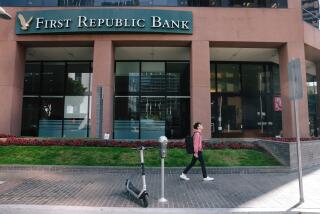Bank fund aims to gird debt market
- Share via
NEW YORK — Three major U.S. banks unveiled plans Monday for an $80-billion fund to buy bonds whose values have plummeted in the wake of the credit crunch induced by the sub-prime mortgage meltdown.
The fund is being launched by Citigroup Inc., Bank of America Corp. and JPMorgan Chase & Co. in hopes of bolstering the market for short-term corporate borrowing, which has yet to recover from the credit crisis that struck over the summer.
The arrangement was agreed to with the involvement of the Treasury Department, which has been concerned that further troubles in the bond market could force banks to curtail their lending, exacerbating the credit crunch and jeopardizing the overall economy.
The plan will “help to foster orderly capital markets,” the Treasury Department said in a statement.
But some experts said it would help banks avoid losses and delay the ultimate cleanup of bad loans. Critics also said the plan would do little to help the still-creaky credit markets recover, and certainly wouldn’t help individual investors or homeowners hurt by the housing downturn.
“It’s not going to make mortgages easier to get, and it’s not going to stop home prices from going down,” said Peter Schiff, head of brokerage firm Euro Pacific Capital in Darien, Conn.
“It’s a bailout of rich people,” said Richard Bove, an analyst at Punk Ziegel & Co.
However, no taxpayer money will go into the new fund, a Treasury spokeswoman said.
“It was made very clear from day one to these banks that there would be no government money spent on this,” she said.
The complex financing vehicle being created would serve as a buyer of last resort for troubled bonds held by other complex entities -- known as structured investment vehicles -- that are affiliated with and managed by Citigroup and other banks.
Such bank-controlled vehicles issue short-term loans called commercial paper and use the proceeds to buy their portfolios of longer-term, higher-yielding assets -- often securities backed by mortgages or other assets.
But the credit crunch did serious damage to the market for commercial paper, and it remains difficult to sell such debt.
The new fund also is intended to sell commercial paper, but Citigroup, Bank of America and JPMorgan have agreed in effect to guarantee that paper.
The new fund will buy only high-rated mortgage-backed bonds and other debt, but not any assets backed by sub-prime mortgages, according to people familiar with the matter.
Because the fund won’t buy the securities that are at the heart of the bond market’s woes and are the hardest to sell, the plan will have limited effect, said James Bianco, president of Bianco Research in Chicago.
“I’m completely at a loss as to how this is going to get the market moving,” he said.
The banks, he added, are “grasping for some scheme that will work.”
The fund would hold the securities until the market improves and they can be sold, the banks hope, or until the bonds mature and are paid in full.
The stock market hit new highs this month as it appeared that the credit crunch was easing and that a big interest-rate cut by the Federal Reserve would help the economy avoid a recession caused by the housing slump. But news of the banks’ plan Monday served as a reminder that the credit crunch wasn’t over, and the Dow Jones industrials sank 108 points.
“It seemed like the markets had made a dramatic recovery, almost forgetting that the third quarter happened,” said Kingman Penniman, head of KDP Investment Advisors Inc. “And now we’re finding out that potentially there are still some very significant roadblocks.”
The troubled bonds in the bank-managed vehicles don’t currently show up on the banks’ balance sheets. But without the new fund, Citigroup and other banks might have to absorb losses on the securities.
Citigroup on Monday said it was taking a $6-billion write-down in part because of mortgage-related woes, sending its third-quarter profit down 57%.
Citigroup is one of the biggest managers of structured investment vehicles. Neither Bank of America nor JPMorgan run such funds, but they will earn fees to set up and run the new fund.
The banks decided to create the fund after Treasury Secretary Henry M. Paulson Jr. called a meeting Sept. 16 to discuss bond-market troubles.
The resulting plan is reminiscent of the 1998 bailout engineered by the Federal Reserve of hedge fund Long Term Capital Management, which had lost billions of dollars on bad bond bets, raising fears of a ripple effect in the financial markets.
--
More to Read
Inside the business of entertainment
The Wide Shot brings you news, analysis and insights on everything from streaming wars to production — and what it all means for the future.
You may occasionally receive promotional content from the Los Angeles Times.










